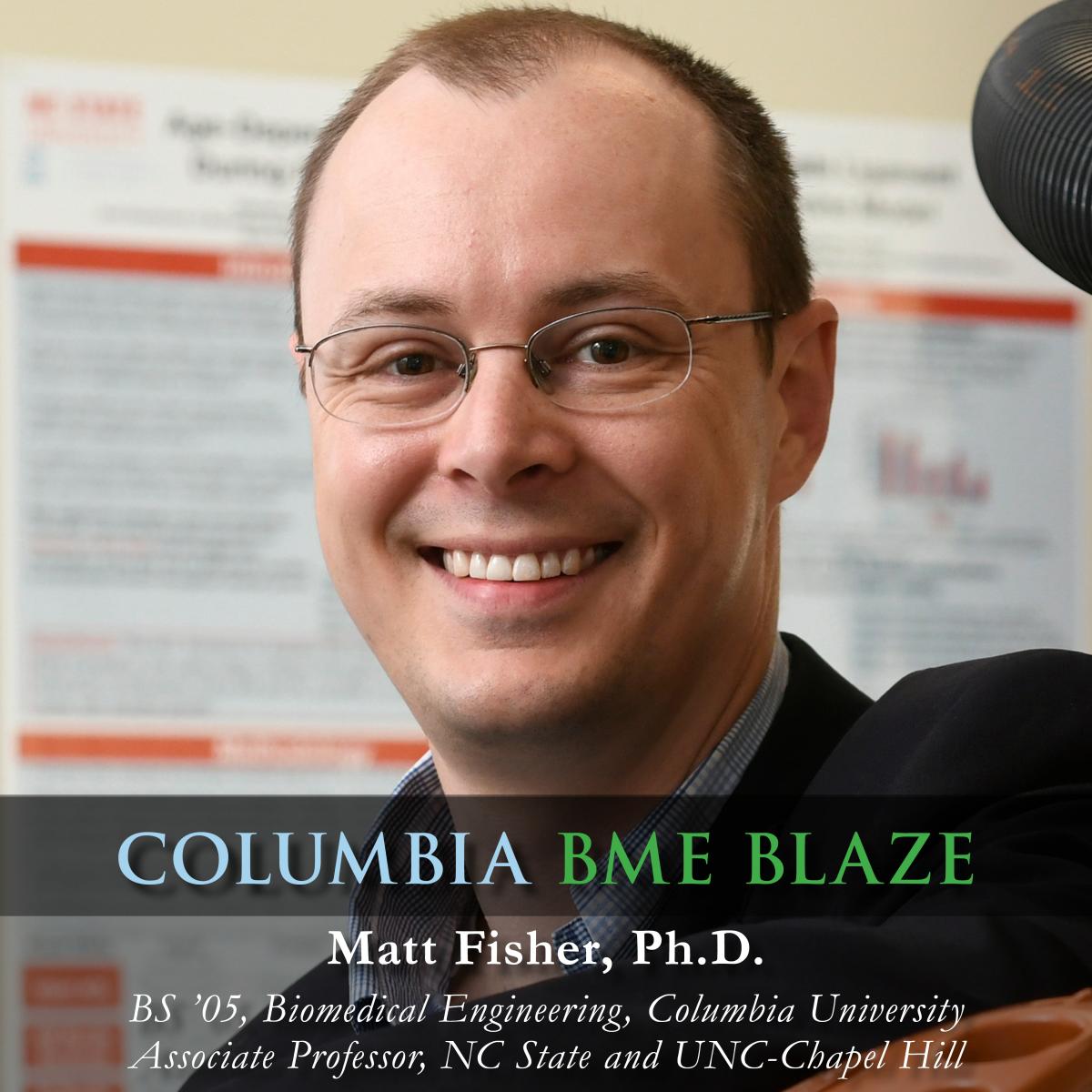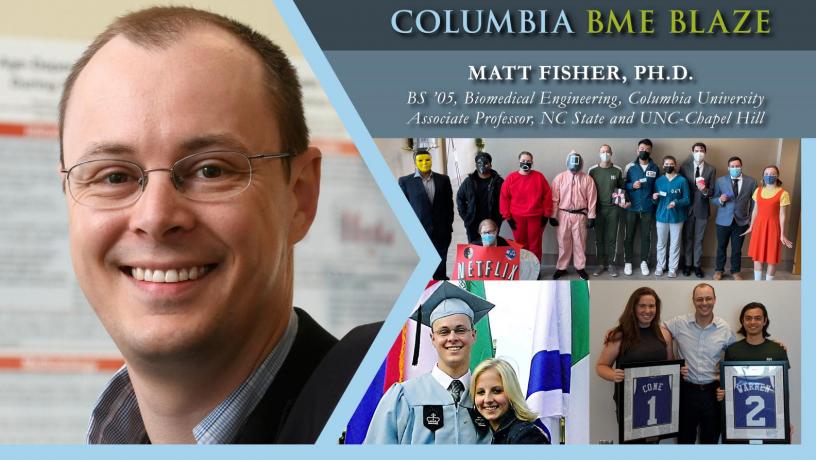May 2022 - BME Blaze: Matt Fisher, PhD
In this monthly spotlight, get to know the alumni, students, and scientists of Columbia's Department of Biomedical Engineering. Read what our BME folks are up to, from our labs' latest research, to our students' plans for the future, to our teams' innovations, start-ups and other career successes.
We enjoyed catching up with Columbia BME alumnus (BS '05) and current associate professor in BME at NC State and UNC-Chapel Hill, Matt Fisher, as he reminisced about his journey from Columbia BME student to BME professor. Read below to get to know Dr. Fisher!

Matt Fisher, PhD
- B.S. Biomedical Engineering, 2005, Columbia University
- Ph.D., Bioengineering, 2010, University of Pittsburgh
Where are you from?
Pittsburgh, PA. Representing the black and gold.
What drew you to the field of Biomedical Engineering?
In school, I was always drawn to math and science, in particular, biology and physics. Writing not so much. Joke’s on me, that’s mostly what I do now.
My high school didn’t really have any engineering offerings that I recall, but I did take an electronics shop class in my junior year. I made some circuit boards, a metal detector, a few other things. I just loved applying knowledge to make things. Eventually, I went on the internet via my home dialup connection, went on a search engine whose name I don’t remember (this was pre-Google), and found that BME was a thing. In fact, it was all the things I liked in one.
What is your current role?
I’m an associate professor in the Joint Department of Biomedical Engineering at North Carolina State University and University of North Carolina at Chapel Hill. I lead a research team focused on orthopaedic soft tissue biomechanics and regenerative medicine. I’m also now the Director of Graduate Studies in our department. This role has been really rewarding in that I get to guide more students through graduate school.
Why did you choose Columbia BME?
Once I was accepted, I visited campus. Although I still had other campus tours to do, I bought a Columbia t-shirt on the way out. Had a feeling.
What were some of your favorite projects/memories from the program?
There are so many. Prof. Clark Hung took me in as an undergraduate researcher to work on tissue engineering of cartilage. I was directly supervised by Dr. Terri-Ann Kelly, who was a graduate student at the time. So thankful to them both for giving me a chance. For senior design, my group proposed a design for tissue engineering of ligaments, and Prof. Helen Lu was gracious and patient enough to advise us. It was really fun to pursue our own ideas, even if the project itself didn’t work that well. And I still study ligaments, so I guess it worked out in the end.
Also, for some reason (and despite a terrible memory in general), I remember a lot of comments that my professors and advisors made (in a good way). Of course, this terrifies me now that I’m on the other side of advising.
What was your proudest moment at Columbia?
Graduation day is an obvious answer, but it’s also the correct one.
How has your experience with Columbia BME contributed towards your goals?
Invaluably. It set me up for success in graduate school and a career in academia. The professional network it provided has had a profoundly positive experience on my career.
What are your thoughts on the strength of Columbia BME's alumni network and how has that influenced your career path?
Aside from the academic training, it’s hard to understate the impact of BME on my social and professional networks. Some of my best friends graduated with me in BME. I ended up as a post-doc for Dr. Rob Mauck, who was a graduate student in BME. Since I stayed in academia, I still see many current and former BME professors at conferences, and they still continue to support me, including ones that I had in class like Professors Hung, Lu, Guo, Ateshian, and Holmes. I’m also friends with many current BME faculty members who joined later.
Any words of wisdom or tips for prospective BME students?
Have fun. It may not seem like it at the time, but many years later, I still look on my time as an undergraduate fondly. And try to network the best you can. It’s still difficult for me, but it’s really important for any career and there are really great folks in BME.
What are you excited about?
As the pandemic dies down (hopefully)? Doing everything normally again. Beyond that, seeing my kids grow and training my students. And of course, I’m always excited about our research.
COLUMBIA BME ACADEMICS
[Columbia BME] set me up for success in graduate school and a career in academia. The professional network it provided has had a profoundly positive experience on my career.

Images (clockwise from top):
1. Lab dressed up on Halloween. We went as ‘Squid Games’ this year.
2. First two PhD graduates from the lab, Dr. Stephanie Cone and Dr. Paul Warren. We hand out jerseys for graduation.
3. Graduation from Columbia in 2005. My girlfriend (and future spouse) Lisa was there to support me.
